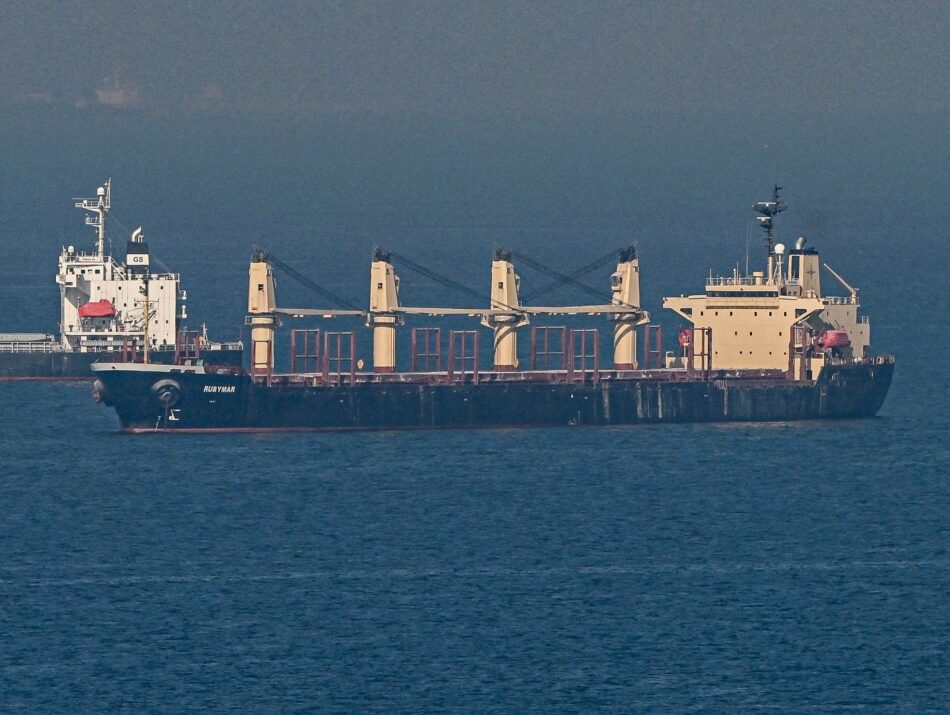The crew of a bulk carrier that had been part of an effort to export Ukrainian grain and which was struck by a Houthi missile at the weekend have now been evacuated from the ship by military assets in the area.
Houthi rebels claimed responsibility after a large cargo ship passing through the Bab el-Mandeb Strait — the narrowest and most vulnerable part of the southern Red Sea route connecting Asia to the Mediterranean by sea — was struck by a missile on Sunday night. The ship, identified as the bulk carrier Rubymar was hit in the engine room in the attack, said Bloomberg citing a company official.
The attack on the Rubymar may be the first serious missile damage inflicted on a merchant ship by the Iran-backed, Shiite Muslim Houthi Rebels, who have launched dozens of missile and drone attacks against passing shipping in solidarity with Hamas since last year. According to information released by Western militaries contributing to the security operation around Yemen, ship owners, and maritime business publications the majority of missile strikes have either failed to make contact with their targets or have caused comparatively minor damage so far that didn’t require the ships to be abandoned.
Yet now the Houthis themselves claimed “catastrophic damage” to the Rubymar in their Sunday night attack, saying the large freighter is disabled and unable to proceed, and “at risk of potentially sinking”. While Western sources say there were no injuries onboard following the strike and the UK military says “vessel at anchor and all crew are safe”, the crew abandoning ship suggests a threat to life to those remaining onboard.
The United Kingdom’s Maritime Trade Operations (UKMTO) service, a military-run office distributing up-to-date information about attacks on merchant ships in the Indian Ocean and Red Sea gave grid references for the attack, showing Rubymar was struck in the narrowest part of the Bab el-Mandeb. This is potentially a serious issue: while a single ship foundering in the strait couldn’t block traffic alone, the presence of a ship not under command or a wreck further narrows the available space for passing traffic, reducing room for manoeuvre and making future transits less safe.
The Houthis have previously threatened to block the straits, one of the world’s key trade routes.
The UKMTO said in their latest update on the Rubymar: “Military authorities report crew have abandoned the vessel. Vessel at anchor and all crew are safe. Military authorities remain on scene to provide assistance.”
While the attack on the Rubymar may be the first serious damage to a ship by Houthi missiles, and may be the first ship taken out since Houthi commandos boarded and captured the Galaxy Leader car transporter in November, the real impact of the attacks has been on confidence in the global maritime trade system. Hundereds of voyages by the some of the largest ships in the world, including oil tankers, bulk carriers, and container ships have been diverted away from the Red Sea over fears and insurance costs have soared.
The immediate extra costs of sending these cargo ships the long way around to get to Europe from Asia, the longer-term rising shipping costs from contraction in ship supply, and insurance costs are potentially considerable inflation factors for import-dependent Western economies already battling strong headwinds.
The Bbelize-flagged, Lebanese-operated, and UK-registered Rubymar previously hit the headlines as it was one of a group of ships that ventured into the Black Sea in an attempt to export Ukrainian grain from its Black Sea ports despite a Russian blockade. Russia said it would treat the ships as legitimate military targets.
